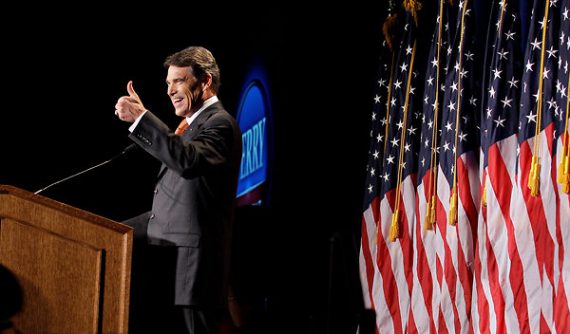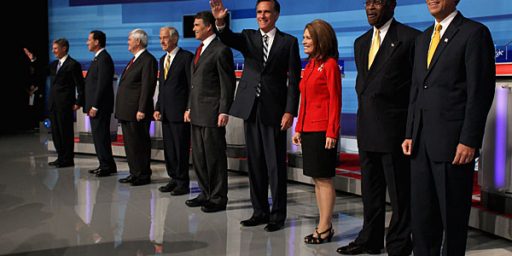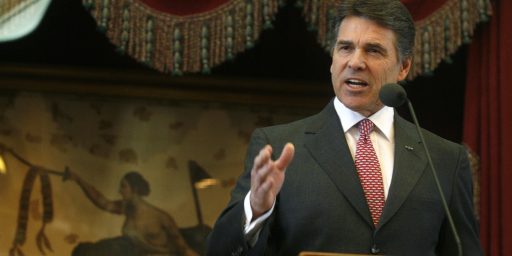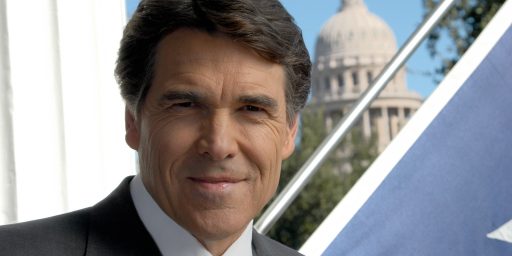Rick Perry: The Candidate of Hope and Change?
Ricky Perry is running on "hope and change" (but what else is new?)
 “If you’re for the status quo in America, I’m not your guy,”—Rick Perry.
“If you’re for the status quo in America, I’m not your guy,”—Rick Perry.
This line struck me as amusing on some levels. First, I always find it funny when a self-proclaimed conservative talks about opposition to the status quo. Second, a call for alteration in the status quo is a call for change and, of course, Republicans endlessly made fun of Obama’s “hope and change” slogan.
Now, I understand that being “conservative” is not just about maintaining the status quo for the status quo’s sake. One thing that is interesting about Perry is that if his rhetoric (e.g., Social Security being a “monstrous lie”) or the contents of his book Fed Up: Out Fight to Save America from Washington, then Perry is really a reactionary who want to turn back the clock to some mythical pre-1933 America. It is rather difficult to fully know what some of the candidates actually believe versus what they think they have to say to garner electoral support.
Of course, much of the GOP zeitgeist at the moment is either reactionary or, even, radical (e.g., Bachmann’s belief that not raising the debt ceiling and living with the economic consequences would be a really good idea). It is difficult to find the true conservative who takes a measured, responsible approach to national problems. Romney may have once fit that mold, but the degree to which he can campaign that way remains to be seen. Likewise, maybe Huntsman fits the general model.
On the “change” issue, I would further elaborate that Perry is very much running on “hope and change” himself. The change part is evidence in the quote above (and, really, is definitionally part of any challenge to an incumbent president). The hope part is also clear in his basic policy prescriptions, which boil down to things like appealing to fairly mystical formulations like America’s “entrepreneurial spirit.” Now, I am a great fan of entrepreneurialism, but simply evoking it is not a policy. And, there is that problematic empirical observation that simply cutting taxes has not, in the last decade, produced the alleged magical economic growth that they are supposed to do. This suggests that perhaps the conundrum in a tad more complicated than simply an issue of tax policy.
As such, Perry sounds rather hopey changey his own bad self.
But, of course, the point is not to defend Obama’s slogan, but to point out two things:
1) Every candidate runs, to one degree or another, on “hope and change.” As such, I always found it a bit silly (and sometimes annoying) when people made fun of the Obama slogan as if doing so constituted a scathing commentary. Again: try and find me a candidate who doesn’t run on some version of that simple theme and you will find out the ubiquity thereof (heck, sometimes even incumbents run on “hope and change”). The funny thing about the Obama campaign is that it was capable of turning a near-universal theme into a brand for 2008.
2) The bottom line is trying to get beyond a general desire for change and figure out what kind of change that a given candidate would impose if they could and then to move on to figure out what the candidate can actually accomplish if elected.






To be fair to Perry, it is early in the process. We should hear the specifics of what he wants to offer. That said, we had best hope that Perry will change if elected. The more one reads, the more he sounds like a typical pay-to-play politician. His attempt to sell dead peasant insurance on Texas teachers sounds like classic crony capitalism (via Cowen).
http://www.huffingtonpost.com/2011/08/25/rick-perry-texas-life-insurance-scheme_n_935666.html
Steve
“Hope & Change” got us rampant joblessness, stagflation and the scorn and ire of decades-old allies. That might not register in a liberal arts program on a college campus, but it certainly hits home on Main Street. Ergo perhaps the working class public might feel its time to change course for the sake of fostering hope. Don’t you see the parallels to 1980? Didn’t Ronald Reagan run on a hope & change platform from the right side of the aisle?
Well, currently we are living Obama’s “hope and change” tag, which has mainly panned out to be a price tag change creating higher deficits, more unemployment, as well as a lifestyle change that has been downgraded, very much like the S & P did with our triple A standing.
However, slogans of hope and change are nothing more than euphemisms painting optimistic mind pictures for people, much like the ancients did with their hieroglyphics on the walls of caves.
So, all Perry is doing is contrasting his type of “hope and change” with what Obama has wrought upon the country. Perry’s promises incorporate more individualism, smaller government, augmented by policies emphasizing greater self reliance over government reliance, which only expands and becomes more cemented in the human psychic with each generation.
@Tsar Nicholas:
i realize im barking at the moon here, but no, hope and change did not bring us our current woes, or otherwise ‘create’ the fundamental issues we are facing. it has done very little to alleviate our woes, for sure, but to pretend our troubles can be dated back to 1-20-2009 is lazy and misleading at best. (the part about ‘mr hope&change being responsible for our degraded standing with our allies is particularly delicious.)
otherwise, i agree that this is standard political messaging as old as politics itself.
::yawn::
If you’re such a fan of entrepreneuralism, then you must also support policies that nourish and help propagate such enterprising human acts. Because without such support, which is the business environment we find ourselves in today, entrepreneuralism starves and either shrinks or dies. I again cite the EPA as being the governmental poison (via Obama’s expansion of their regulatory perimeters to include greenhouse gases) creating a virtual wasteland for existing businesses, as well as future ones.
I think you’ve been discussing changes Perry wishes to impose already on this blog. His primary one dealing with reforming entitlement programs. But, what happens in progressive banter is that they get caught up in mulling over the language of a conservative’s presentation, such as Perry calling SS a “Ponzi” scheme. In actuality SS does parallel the outcome of SS, in that younger contributors are less assured of reaping any returns on their SS deductions. However, it is mainly the technicalities that are magnified and derided, being that the intention of SS was not to be fraudulent (even thought the management of it certainly is), so ergo it is not considered a Ponzi scheme…and, shame on Perry for insinuating it is!
@jan:
The irony runs deep.
@john personna:
No, I wouldn’t call labeling the EPA as governmental poison ‘irony.’ In fact your unawareness of what is economically happening around you, is ironically delusional.
In fact, I think social progressives need a little bell to go off, much like what was recommended by Thich Nhat Hanh, in order to bring people to an awareness of the present.
Jan, for someone who comes off as reasonably intelligent and challenging in most posts, you sound just like the reflexively anti-conservative crowd with your blanket statements and generalizations. Your hyperbole does a disservice to whatever valid points you may be making.
No, I wouldn’t call labeling the EPA as governmental poison ‘irony.’ In fact your unawareness of what is economically happening around you, is ironically delusional.
You obviously don’t understand the meaning of the term “irony.”
But, what happens in progressive banter is that they get caught up in mulling over the language of a conservative’s presentation, such as Perry calling SS a “Ponzi” scheme.
It’s unfair to pay attention to the words Republicans use to describe things. Most unfair.
Was 2008 a “change ” election?
If it was how come it seems little has changed? Does having reactionary/radical GOP candidates currently in the lead make 2012 a change election? Is this even a valid concept? It’s so much easier to let others do the thinking if this interests anyone else.
@CB:
Ok, Here is just a tip of the iceberg dealing with the EPA’s overreach that is effectively putting even more of a fiscal burden on our struggling economy.
With the rage currently being anti-CO2 at all costs, we are shooting ourselves in the foot with the EPA’s zealous regulations. On one hand we call for business to unleash their monies and invest in private enterprise expansion. While, on the other hand we force more and more tyrannical legislation on business causing them to shrink back into a protective hole and not want to come out until Obama is gone.
The same hostile business environment occurred under FDR. By the time he tripled taxes and pushed through all his anti-business legislation, unemployment was still high, 14% in the early 40’s, and a 1941 Fortune poll revealed that 93% of employers, after years of FDR’s socially progressive rule, felt “their property rights to be undermined, and anticipated the possibility of a dictatorship.” This is called not having confidence in your government, the same thing being felt by today’s business, which is why we are having problems with job creation.
@jan:
That’s kind of the key, Jan. For some conservatives the EPA is only about what they haven’t done yet, and things like Love Canal and Superfund Sites are just forgotten.
We had real poisons, in the wild, at Love Canal. We didn’t need to invent them as inopportune hyperbole.
Damn EPA.
@jan:
Apart from fantasies about some phantom structural change in January of 2009, I am not sure what you are alleging. The basic structure of the business environment has not radically altered under the current administration.
The main problem for entrepreneurs at the moment is lack of demand in the economy (not to mention things like the serious unresolved problems in the housing market). Regardless of what one may feel about the current occupant of the White House, there are no policies that one can point to that have caused the fundamental problems we face. Indeed, when it comes the major issue that is heralded by Mr. Perry and the GOP these days (i.e., taxes) the truth is that there have been no taxes increased to date under this admin, and indeed have been tax cuts. As such, you are not making an argument, you just asserting.
we force more and more tyrannical legislation on business
Give us some examples of the “tyrannical legislation on business.”
I think john gets to the problem i have with vilification of the EPA specifically and letter agencies in general– the tendency to view them all in a binary (good vs bad, job killing vs job producing) light. Knowing nothing of the policy jan posted, i cant comment specifically, and it does sound rather heavy handed and unrealistic. I would assume that it will be subject to revision and paring down before it becomes policy, but even if not, I fail to see how this invalidates the EPA’s very existence. Does it sound like a regulation worth bringing attention to, and changing? Possibly. Does it follow that we should gut the EPA and let big industry (what is left of it anyway…) do as they please? Hardly.
And when discussing poll numbers and attitudes from the 1940’s, lets not forget that fascism wasnt some esoteric idea…it was being practiced on a worldwide scale. Im not looking for a history fight, but i would think that the worldwide state of affairs in 1941 had more to do with general unease than FDR’s regulations.
that too. the fantasy that obama is strangling businesses in their cribs drives me mad.
I wonder why they would feel that way, Jan…. Ohhh. Wait a minute….. Maybe it is because one of the leading GOP candidates is calling it a “Ponzi scheme” and openly wants to end it? And the entire GOP caucus voted for a budget that would end Medicare?
I suspect the younger contributors are unsure for a reason.
First, candidates don’t always run on hope and change. In 1952, the Dems used the unintentionally amusing slogan “You never had it so good.” And even when they do use change as a theme, it isn’t necessarily the emphasis. Candidates usually tailor their campaigns to the problems of a particular time. In the wake of Watergate, Carter ran on personal character; Bush did something similar in 2000. Clinton in ’92 ran on “It’s the economy, stupid.” None of those things would have much fit the 2008 election, when we were in the middle of two hapless wars in addition to a terrible recession. Character wasn’t much on people’s minds, since most people didn’t attribute the problems to lack of integrity per se. And focusing exclusively on the economy would have seemed too narrow. Republicans in 2012 will probably run more of an “It’s the economy, stupid” type of campaign, since foreign policy appears to be one of Obama’s strengths at the moment, and although attacking Obama’s character may work in the GOP primaries, it is unlikely to be effective in the general election, where he still polls well in favorability and even higher in likability.
For a more comprehensive look at the proposed EPA rules and its effects, go to the link. This is not new technology. Most plants are compliant already. We have sufficient excess. We do have regional transmission issues. New capacity can be built quite quickly. While mercury is the cited contaminant, I believe (cant find in my archives) that particulant pollution is also a problem with these older plants. However, the EPA will not make a final decision on these rules until November. People should write their Congressperson if they feel strongly about this, after reading some more I hope. (The WSJ has a very strong POV in their writings. It needs to be balanced by other viewpoints.)
http://mediamatters.org/research/201108300022
Steve
@steve:
…and you think that the liberal hack, Media Matters, has a non-partisan POV. Please, that is so erroneous!
@jan: Hi I prefer to slime the messenger then confront the message..
@jan- I did not say that. I think people should read both sides of issues that they care about. I assume the truth is usually somewhere in the middle. I did say that the Media Matters is more comprehensive as they provide more links to original sources and more complete quotes. To be fair, I suspect the WSJ piece had more space limitations.
Steve
@steve:
A fair response….
*Ring* *Ring* Hi, it’s the Pot, I’d like my black back…
@jan, I’m having a hard time remembering cases where you’ve posted materials that didn’t come from “conservative hack” sites/editorialists (Pajamas Media, NRO, Economist, Red State) and didn;t implicitly (or explicitly) present them as (unbiased) “fact.”